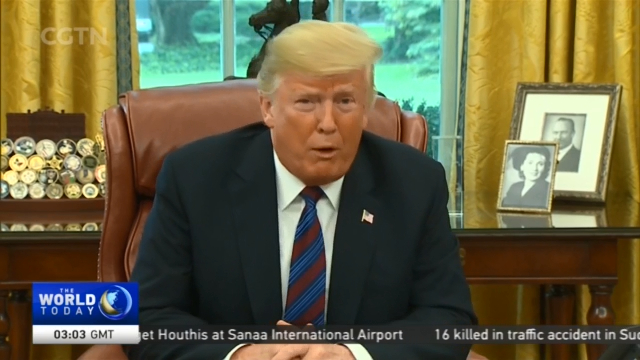
12:12, 28-Aug-2018
U.S.-Mexico Trade Deal: Presidents Trump, Pena Nieto agree to bilateral deal
Updated
11:04, 31-Aug-2018
03:01

The United States and Mexico have reached a preliminary trade deal. President Trump is refusing to call it a new NAFTA. And the deal is missing a key partner. CGTN's Roee Ruttenberg explains.
Donald Trump teased his news on Monday on Twitter "A big deal looking good with Mexico" he wrote. Then, hours later, in the Oval Office, the U.S. President announced his first significant step to replace NAFTA-the 24-year-old free trade deal with Canada and Mexico.
DONALD TRUMP U.S. PRESIDENT "I like to call this deal the United States-Mexico Trade Agreement. I think it's an elegant name. I think NAFTA has a lot of bad connotations for the United States, because it was a rip-off."
NAFTA is the North American Free Trade Agreement. And missing from the new name is Canada-the third party in that trio. Mexico's outgoing President, Enrique Pena-Nieto, urged Trump to ensure that Ottawa was on board. Trump, in turn, threatened Washington's neighbor-to-the-North with tariffs on car imports if it didn't agree to his terms. But said: he'd soon be speaking with Prime Minister Justin Trudeau. A spokesman for the Canadian foreign ministry said he was pleased that Canada's NAFTA partners had worked out THEIR differences. But gave little indication to where Canada stood in its own negotiations. Still, many Trump supporters will see Monday's announcement as a win in Trump's divide-and-conquer strategy. The U.S. president prefers bilateral agreements over multilateral ones. Trump sought better terms for American carmakers. U.S. trade officials suggested: he got that from Mexico. And American manufacturers reacted positively to the news. Trump-the-candidate and then Trump-the-President has often rallied his base by railing against NAFTA, claiming the agreement sent American jobs south of the border, where labor is cheaper. The deal also sent American goods with them. Cheap and subsidized U.S. corn largely decimated Mexico's corn industry. Mexico's incoming foreign minister also stressed the need to include Canada. But said this initial agreement was a good first step.
MARCELO EBRARD INCOMING MEXICAN FOREIGN MINISTER "It encompasses the main worries mentioned by the president-elect's team, especially those related to the Mexican energy sector, the work and salary conditions of our workers and the maintenance of trilateral spaces for the solution of controversies, as well as the certainty in the medium term of the treaty."
But the country's incoming President - Andres Manuel Lopez Obrador, a populist on Mexico's political left - has voiced caution about dealing with Trump - and trusting him.
ROEE RUTTENBERG WASHINGTON DC "Which may explain why U.S. officials are rushing to get any deal through. The American Congress needs at least 90 days to review it. Lopez Obrador takes office on December 1st. That leaves just a few days for Canada to join this deal. Or, the White House may be stuck starting over with a new President - and perhaps less-friendly partner - down south. Roee Ruttenberg, CGTN, in Washington."

SITEMAP
Copyright © 2018 CGTN. Beijing ICP prepared NO.16065310-3
Copyright © 2018 CGTN. Beijing ICP prepared NO.16065310-3